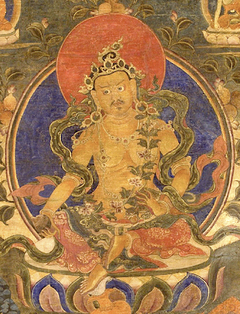Jambhala Sādhana
༄༅། །ཛཾ་བྷ་ལའི་སྒྲུབ་ཐབས་བཞུགས།
A Sādhana of Jambhala
by Mipham Rinpoche
རང་ཉིད་སྐད་ཅིག་དཔལ་ལྡན་ཛཾ་བྷ་ལ། །
rangnyi kechik palden dzam bha la
In a single instant, I am the glorious Jambhala,
གསེར་མདོག་དར་དང་རིན་ཆེན་རྒྱན་གྱིས་མཛེས། །
ser dok dar dang rinchen gyen gyi dzé
The colour of gold, beautiful in silk and jewel ornaments.
ཕྱག་གཡས་ཤིང་ཐོག་བི་ཛ་པཱུ་ར་ཀ །
chak yé shingtok bidza pura ka
My right hand holds a bījapūraka fruit,1
གཡོན་པས་རིན་ཆེན་གཏེར་གྱི་ནེའུ་ལེ་འཛིན། །
yönpé rinchen ter gyi né'u lé dzin
And my left a mongoose of jewel treasure.
ཕྱེད་སྐྱིལ་པདྨ་ཟླ་བའི་གདན་ལ་བཞུགས། །
chekyil pema dawé den la zhuk
I am in half-lotus posture on a lotus and moon.
ཐུགས་ཀར་ཟླ་སྟེང་ཛཾ་ལ་སྔགས་ཀྱིས་བསྐོར། །
tukkar da teng dzam la ngak kyi kor
At my heart upon a moon-disc is a syllable dzaṁ surrounded by the mantra.
ན་མོ་རཏྣ་ཏྲ་ཡཱ་ཡ། ན་མོ་མ་ཎི་བྷ་དྲ་ཡ། མ་ཧཱ་ཡཀྵ་སེ་ནཱ་པ་ཏ་ཡེ། ཨོཾ་ཛཾ་བྷ་ལ་ཛ་ལེནྡྲཱ་ཡ་སྭཱ་ཧཱ།
namo ratna traya ya | namo mani bhadraya | maha yaksha séna patayé | om dzambhala dzalendraya soha
namo ratna-trayāya | namo maṇibhadrāya | mahāyakṣa senapataye | oṃ jambhala jalenḍrāya svāhā
གང་ཐོས་ནས་ཚེ་རབས་ཐམས་ཅད་དུ་དབུལ་བ་དང་རྒུད་པའི་སྐལ་བ་རྒྱུན་ཆད་དེ་དཔལ་དང་སྐལ་བ་བཟང་པོ་ཕུན་སུམ་ཚོགས་པར་བྱེད་པ། མཐར་ཐུག་སངས་རྒྱས་ཀྱི་གོ་འཕང་སྦྱིན་ཅིང་མཆོག་ཐམས་ཅད་འདོད་པ་བཞིན་དུ་སྩོལ་བའི་གསང་སྔགས་ཁྱད་པར་ཅན་སྔགས་ཀྱི་མགོན་པོ་དང་བཅས་པ་ཅི་ནུས་བཟླ་ཞིང་། སྙིང་པོ་འབྲུ་བཅུ་པ་ཉིད་གཙོ་བོར་བཟླའོ། །
Whoever hears this mantra will, in all their lifetimes, be free from poverty and disadvantage, and accumulate an abundance of fortune. Finally, they will attain the state of Buddhahood. Recite this secret mantra, the excellent seed and other syllables, which bestows the fulfilment of all supreme wishes, as many times as possible, but mainly recite the ten-syllable heart mantra.
Praise
ནོར་གྱི་དབང་ཕྱུག་རིན་ཆེན་གཏེར་མངའ་ཞིང་། །
nor gyi wangchuk rinchen ter nga zhing
Sovereign of riches, who possesses troves of treasure,
གནོད་སྦྱིན་ནོར་འཆང་མང་པོ་ཀུན་གྱི་རྗེ། ། །
nöjin nor chang mangpo kün gyi jé
Master of the many yakṣhas and wardens of wealth,
བྱང་ཕྱོགས་སྐྱོང་བའི་མགོན་པོ་ཛམྦྷ་ལ། །
jangchok kyongwé gönpo dzambhala
Jambhala, the lord who guards the northern direction,
དངོས་གྲུབ་མཆོག་སྩོལ་མཛད་ལ་ཕྱག་འཚལ་བསྟོད། །
ngödrub chok tsol dzé la chaktsal tö
Bestower of supreme siddhis—homage and praise to you.2
ཐུན་མཚམས་མཎྜལ་སོགས་ཀྱིས་མཆོད་ཅིང་བསྟོད་ལ་གསོལ་བ་གདབ། རྗེས་མི་དམིགས་པར་བསམས་ནས་དགེ་བསྔོ་ཤིས་བརྗོད་བྱའོ། །
In between sessions, offer the maṇḍala and so forth, and recite praises and supplications. Conclude with non-conceptual meditation, the dedication of merit and verses of auspiciousness.
ཞེས་པའང་མི་ཕམ་པས་སོ།།
This was written by Mipham.
| Translated by Abraham Ta-Quan, 2019. Updated with additional verse translated by Adam Pearcey, 2024.
Source:
ʼJu mi pham ʼjam dbyangs rnam rgyal rgya mtsho. "Dzaṃ bha laʼi sgrub thabs" In gsung ʼbum mi pham rgya mtsho. [Gangs can rig gzhung dpe rnying myur skyobs lhan tshogs], 2007. Vol. 25: 398–399
Version: 2.0-20241210
